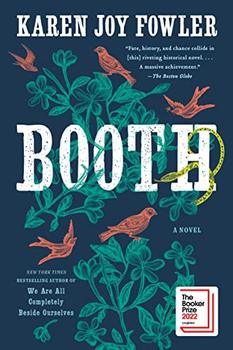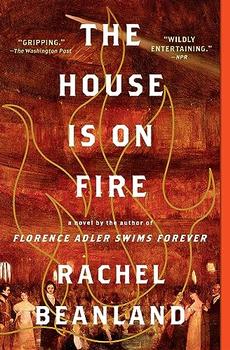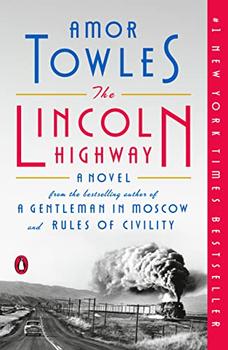Summary | Excerpt | Reading Guide | Reviews | Beyond the book | Read-Alikes | Genres & Themes | Author Bio

John Wilkes Booth is remembered as the actor who assassinated President Abraham Lincoln at Ford's Theatre on April 14, 1865. But his family may just be of greater interest. In an epic fictional sweep from 1822 to nearly the close of the century, Karen Joy Fowler surveys the Booth family's triumphs and tragedies.
Patriarch Junius Brutus Booth is a melodramatic Shakespearean actor, often away on tour. He vociferously defends his beliefs in equality and vegetarianism, yet leases slave labor on his family farm near present-day Bel Air, Maryland. Mother is frequently pregnant and eventually there are 10 children, four of whom die young. Parts of the novel are told from the perspective of oldest daughter Rosalie. "Grief has destroyed Rosalie's parents right before her eyes," Fowler writes. "It seems to Rosalie that God has reached down and scooped out the middle of her family as if He were eating a watermelon." These lost children linger in the household as ghostly reminders of failure and the hand of fate.
The narration also prioritizes the point of view of second son Edwin, who follows in his father's footsteps as an actor — and an abuser of alcohol. "In spite of the raving and drunkenness, the violence and temper, the Booth children all adore their father." Eldest child Junius also becomes an actor and theater manager; John (nicknamed "Johnny"), the second-youngest, has no natural acting talent but pushes himself to memorize Shakespeare monologues so that he, too, can be a part of the family dynasty (see Beyond the Book).
Short asides chronicle Lincoln's rise in parallel. Fowler slips in passages that trace the country's political turmoil, not just over slavery but also concerning immigration — Johnny aligns himself with the xenophobic Know-Nothing party, and is a Confederate sympathizer. The novel draws in a lot of big topics: the treatment of Black people in the United States, addiction, mental illness and extramarital relationships. It also gives intimate details of the everyday challenges of 19th-century life, such as during a hard winter when the family nearly starves.
It's clear from his childhood onward that Johnny is on the wrong path. He "runs with a gang of young toughs who call themselves the Baltimore Bully Boys" and instigates a rebellion at his boarding school; he beats up neighbors and kills animals for fun.
The foreshadowing of what is to come is sometimes heavy-handed. Fifteen-year-old Johnny boasts, "Turns out I'm quite a decent shot." We learn that a future family wedding announcement will list "two … brothers, the late Junius Booth Jr. and the late great actor Edwin Booth. No other brother will be mentioned." There is dramatic irony between what characters think and what we now know, as when Mother says of Johnny, "If only he would keep out of scrapes. He's such a good boy at heart."
But not all of the foreshadowing is Fowler's own. In real life, Johnny wrote down a fortune teller's early-1850s assessment of him and kept the paper on his person, often referring to it in the future. Part of it reads, "You'll die young … You're born under an unlucky star. You've got in your hand a thundering crowd of enemies—not one friend—you'll make a bad end … You'll have a fast life—short, but a grand one." What a gift to a fiction writer!
There are plenty such dramatic moments, but the extended timeline means there is also some skating over of long periods. Booth is low on scenes and dialogue, with Fowler conveying a lot of information through exposition. Luckily, the present-tense narration goes a long way toward making this less of a dull group biography and more of an unfolding story. I also appreciated that Rosalie and the other Booth sister, Asia, are given major roles as point-of-view characters. Fowler acknowledges in the afterword that there is little trace of Rosalie in the historical record, but she felt it important to imagine her so as to convey how limited life was for chronically ill women at the time. (Rosalie was known as an "invalid" and her death certificate mentioned scoliosis.)
Truth is stranger than fiction, the old saying goes. That's the case with the Booth family for sure. And the matters considered here, like racial equality, political divisions and mistrust of the government, are just as important in our own day, as Fowler remarks in her author's note. I've also read her We Are All Completely Beside Ourselves and The Jane Austen Book Club, and each book is totally different. That's proof of a talented and versatile novelist. I'd especially recommend Booth to fans of Geraldine Brooks' March and Maggie O'Farrell's Hamnet.
![]() This review was originally published in The BookBrowse Review in March 2022, and has been updated for the
February 2023 edition.
Click here to go to this issue.
This review was originally published in The BookBrowse Review in March 2022, and has been updated for the
February 2023 edition.
Click here to go to this issue.

If you liked Booth, try these:

by Rachel Beanland
Published 2024
The author of Florence Adler Swims Forever returns with a masterful work of historical fiction about an incendiary tragedy that shocked a young nation and tore apart a community in a single night—told from the perspectives of four people whose actions during the inferno changed the course of history.

by Amor Towles
Published 2023
Winner of the 2021 BookBrowse Fiction Award
The bestselling author of A Gentleman in Moscow and Rules of Civility and master of absorbing, sophisticated fiction returns with a stylish and propulsive novel set in 1950s America.
Your guide toexceptional books
BookBrowse seeks out and recommends the best in contemporary fiction and nonfiction—books that not only engage and entertain but also deepen our understanding of ourselves and the world around us.